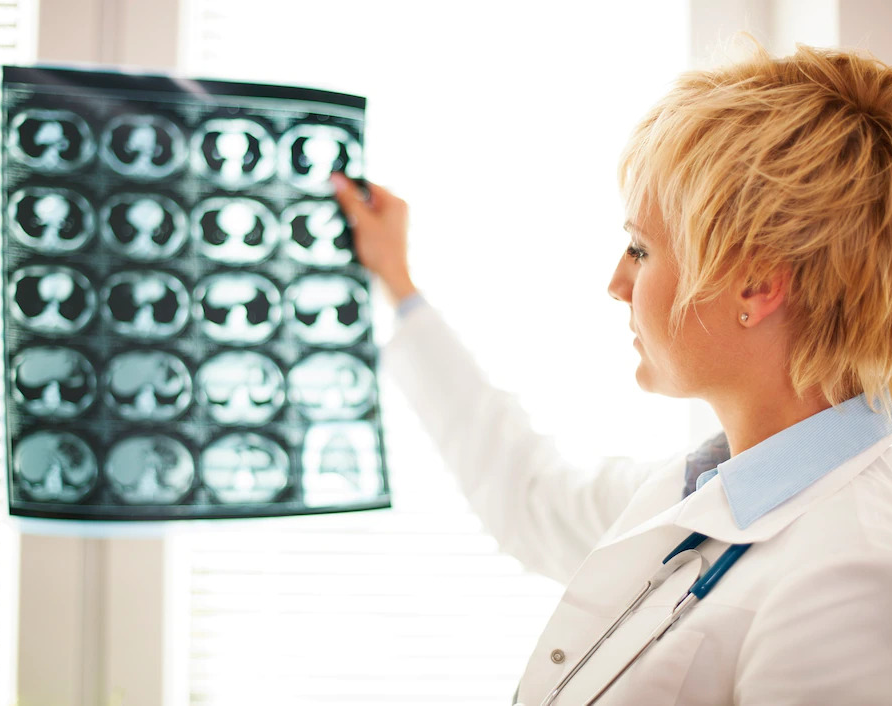Imaging
Diagnostic Testing
Saint Mary’s diagnostic tools provide the highest quality of care and improved patient outcomes. We offer a wide range of services and our Picture Archiving Communication Systems (PACS) system allows for rapid access to images for radiologists and clinicians.
For further information, contact us at 816-655-5767
Mammography
Early detection of breast cancer greatly increases survival rates. That’s why the American Cancer Society recommends a mammogram every year for women ages 40 and older.
Screening mammograms can check for breast cancer in women who have no signs or symptoms of the disease. Screening mammograms usually involve two or images, of each breast. The x-ray images make it possible to detect tumors that cannot be felt.
If anything abnormal is found in a screening mammogram, a diagnositic mammograms may be ordered. Besides a lump, signs of breast cancer can include breast pain, thickening of the skin of the breast, nipple discharge, or a change in breast size or shape. However, these signs may also be signs of benign conditions.
3D Mammography
Clearer. Sharper. More detail. Earlier Detection.
3D mammography is a revolutionary new screening and diagnostic breast imaging tool that improves early detection of breast cancer. Plus, it reduces the likelihood of false positives, decreasing stress from additional unnecessary follow-up appointments.
The Breast Center at St. Mary’s Medical Center offers and expanded mammography hours:
Monday, Tuesday, Thursday and Friday: 7 a.m.-7 p.m.
Wednesday: 7 a.m.-5 p.m.
Walk-in mammograms are available Monday-Thursday, 8-11:30 a.m., and 1-4 p.m.
You don’t need a physician referral for a screening mammogram. To schedule an appointment with the Breast Center, call 816-655-5515.
Breast Ultrasound
Breast ultrasound is a procedure used for further evaluation of a palpable breast abnormality or a density specific lump seen on mammography. It is an imaging technique using high frequency sound waves to scan the breast. Ultrasound can locate and measure abnormal changes or lesions in the breast and determine if a breast lump is solid (tumor) or filled with liquid (cyst).
Breast MRI
Magnetic Resonance Imaging (MRI) of the breast is a noninvasive diagnostic tool used to detect breast cancer and other abnormalities in the breast.
A breast MRI captures multiple images of the breast using a dedicated computer generating detailed images. The study involves obtaining pictures of the breast before and after contrast administration in an effort to display not only the size and shape of a lesion, but how it enhances, which can differentiate benign and malignant lesions.
The radiologist will review the MRI and send a report to the referring physician. Breast MRI is usually performed when a physician needs more information than a mammogram, ultrasound or clinical breast exam can provide. MRI of the breast is not a replacement of mammography or ultrasound, but rather a supplemental tool for detecting and staging breast cancer and other breast abnormalities.
MRI imaging of the breast is most commonly used for:
- Assessing the extent of breast cancer and/or evaluating for other cancers in that breast and the opposite breast prior to breast conservation surgery. This screens those at a high risk for the disease, particularly those with a strong family history of breast disease or ovarian cancer, Jewish ethnicity, BRCA + and women with a history of radiation therapy to the chest, i.e.,
- Hodgkins disease.
- Evaluating indeterminate abnormalities detected by mammography or ultrasound.
- Distinguishing scar tissue from recurrent tumors
- Assessing the effectiveness of chemotherapy.
- Determining the primary site of cancer in women with abnormal lymph nodes.
- Determining the integrity of breast implants
Galactogram
If a patient has nipple discharge, a galactogram is used to view breast ducts and is helpful in diagnosing breast cancer. Our experienced radiologists will place a blunt-ended probe into the duct with discharge. A contrast material is then injected into the duct and mammograms are taken to determine if a lesion is causing the nipple discharge.
For more information, call the Breast Center at 816-655-5767.
Featured Services
Breast Health

Cardiology
Emergency Services
Orthopedics



